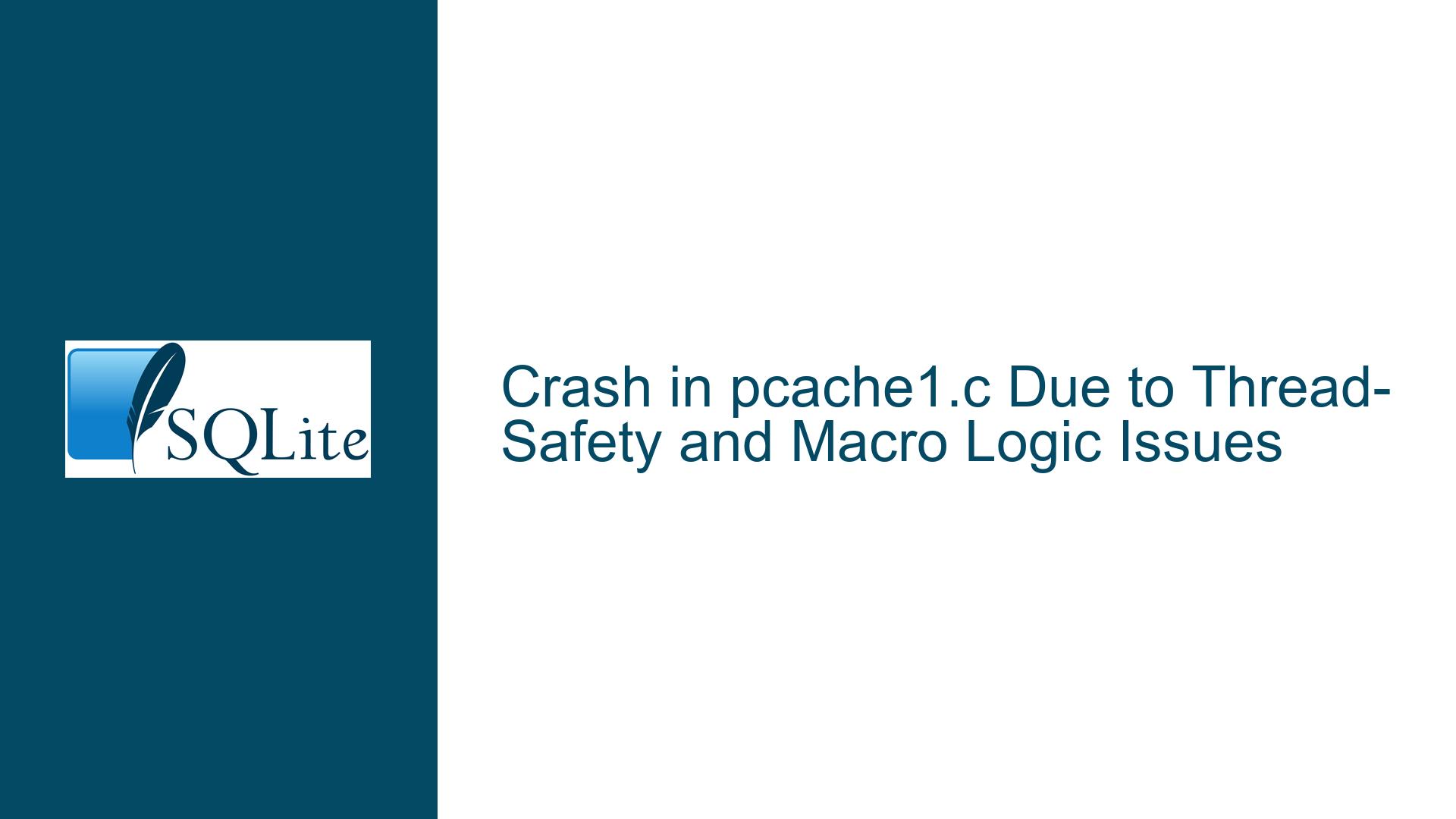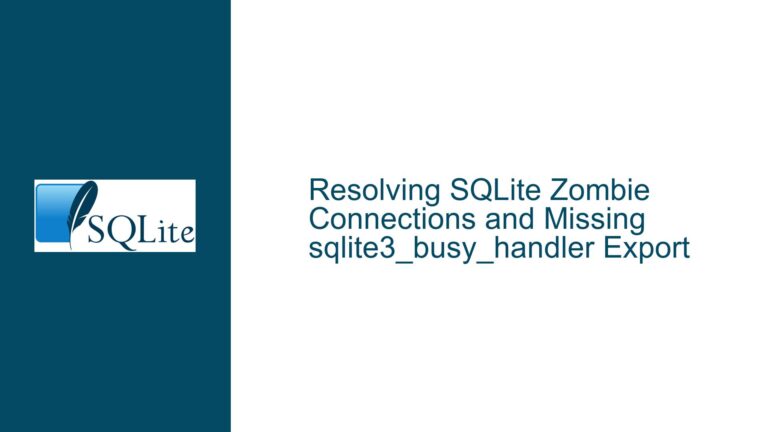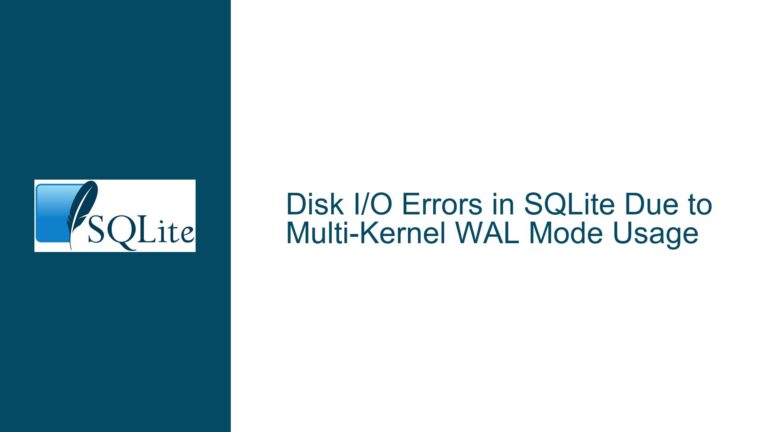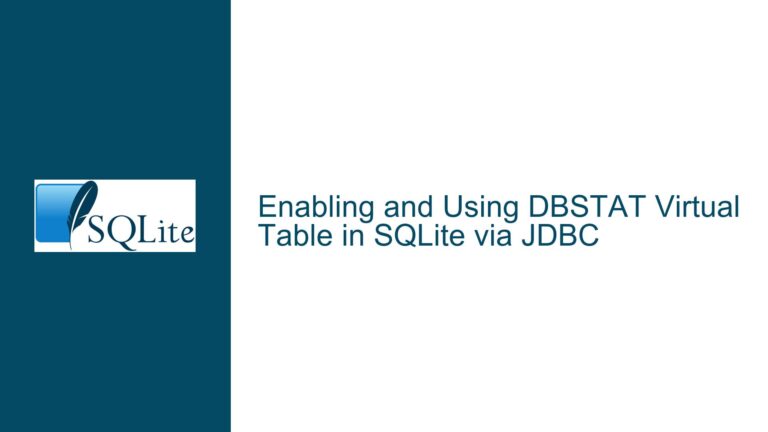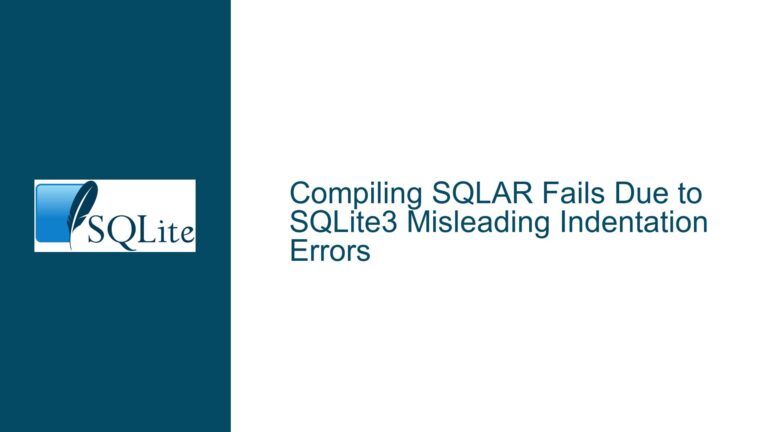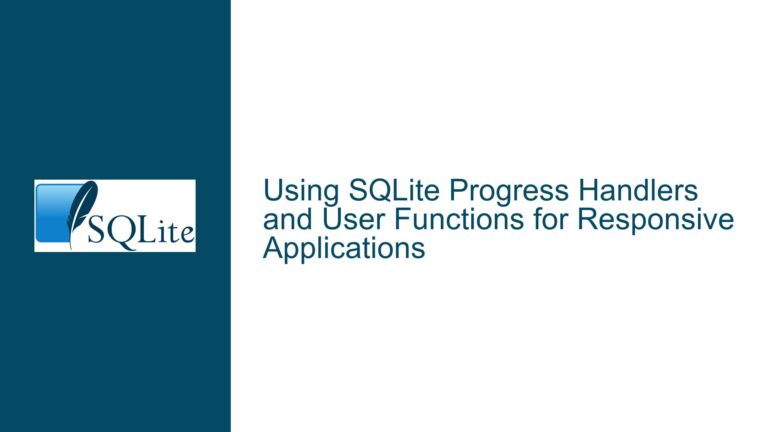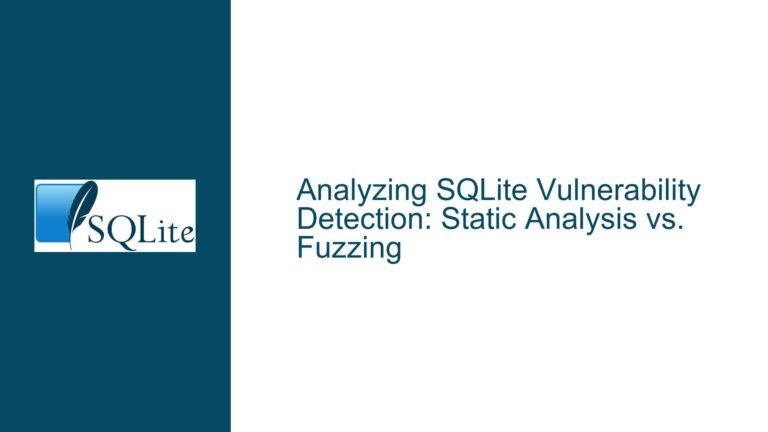Crash in pcache1.c Due to Thread-Safety and Macro Logic Issues
Issue Overview: Dereferencing Garbage Pointer in pcache1.c After iOS18 Update
The core issue revolves around a crash occurring in the SQLite library, specifically within the pcache1.c file, after the release of iOS18. The crash manifests as an attempt to dereference a garbage pointer (0x30), which is a clear indication of memory corruption or an invalid memory access. The crash stack trace points to the pcache1RemoveFromHash function at line 602 in pcache1.c, which is called during the execution of pcache1FetchStage2, sqlite3PagerGet, and other related functions. This sequence of events suggests that the issue is deeply rooted in the page cache management system of SQLite, particularly in how it handles thread safety and memory management.
The crash is intermittent and was rarely observed before the iOS18 update, which implies that changes in the operating system’s memory management or threading behavior might have exacerbated a pre-existing but latent issue in the SQLite library. The focus of the discussion is on the macros pcache1EnterMutex and pcache1LeaveMutex, which are responsible for managing thread synchronization in the page cache subsystem. The current implementation of these macros uses a logical OR (||) in the preprocessor directive, and there is a suggestion that this should be replaced with a logical AND (&&) to ensure proper thread safety.
The macros in question are defined as follows:
#if !defined(SQLITE_ENABLE_MEMORY_MANAGEMENT) || SQLITE_THREADSAFE==0
# define pcache1EnterMutex(X) assert((X)->mutex==0)
# define pcache1LeaveMutex(X) assert((X)->mutex==0)
# define PCACHE1_MIGHT_USE_GROUP_MUTEX 0
#else
# define pcache1EnterMutex(X) sqlite3_mutex_enter((X)->mutex)
# define pcache1LeaveMutex(X) sqlite3_mutex_leave((X)->mutex)
# define PCACHE1_MIGHT_USE_GROUP_MUTEX 1
#endif
The concern is that the current logic might not be correctly handling cases where memory management is enabled (SQLITE_ENABLE_MEMORY_MANAGEMENT is defined) and the library is configured to be thread-safe (SQLITE_THREADSAFE is set to 1). This could lead to situations where the mutex is not properly acquired or released, resulting in race conditions and memory corruption.
Possible Causes: Thread-Safety and Macro Logic Misconfiguration
The crash in pcache1.c is likely caused by a combination of factors related to thread safety and the configuration of the SQLite library. The primary suspect is the macro logic that controls the acquisition and release of the mutex in the page cache subsystem. The current implementation uses a logical OR (||) in the preprocessor directive, which means that the mutex operations are bypassed if either SQLITE_ENABLE_MEMORY_MANAGEMENT is not defined or SQLITE_THREADSAFE is set to 0. This logic might be incorrect, especially in scenarios where memory management is enabled (SQLITE_ENABLE_MEMORY_MANAGEMENT is defined) and the library is configured to be thread-safe (SQLITE_THREADSAFE is set to 1).
In such cases, the macros pcache1EnterMutex and pcache1LeaveMutex would not acquire or release the mutex, leading to potential race conditions when multiple threads attempt to access or modify the page cache simultaneously. This could result in memory corruption, which would explain the attempt to dereference a garbage pointer (0x30) in the pcache1RemoveFromHash function.
Another possible cause is the interaction between the SQLite library and the iOS18 operating system. The iOS18 update might have introduced changes in how memory is managed or how threads are scheduled, which could have exposed latent issues in the SQLite library. For example, iOS18 might be more aggressive in reclaiming memory or might have altered the behavior of thread synchronization primitives, leading to increased contention or improper handling of mutexes in the SQLite library.
Additionally, the crash might be related to the way the page cache is managed in SQLite. The page cache is a critical component of SQLite’s performance optimization, as it caches frequently accessed database pages in memory to reduce disk I/O. However, if the cache is not properly synchronized across threads, it can lead to inconsistencies and crashes. The pcache1FetchStage2 function, which is part of the page cache management system, is involved in the crash stack trace, suggesting that the issue might be related to how the cache is being accessed or modified by multiple threads.
Troubleshooting Steps, Solutions & Fixes: Correcting Macro Logic and Ensuring Thread Safety
To address the crash in pcache1.c, the first step is to correct the macro logic that controls the acquisition and release of the mutex in the page cache subsystem. The current implementation uses a logical OR (||) in the preprocessor directive, which might be incorrect. The suggestion is to replace the logical OR with a logical AND (&&), as shown below:
#if !defined(SQLITE_ENABLE_MEMORY_MANAGEMENT) && SQLITE_THREADSAFE==0
# define pcache1EnterMutex(X) assert((X)->mutex==0)
# define pcache1LeaveMutex(X) assert((X)->mutex==0)
# define PCACHE1_MIGHT_USE_GROUP_MUTEX 0
#else
# define pcache1EnterMutex(X) sqlite3_mutex_enter((X)->mutex)
# define pcache1LeaveMutex(X) sqlite3_mutex_leave((X)->mutex)
# define PCACHE1_MIGHT_USE_GROUP_MUTEX 1
#endif
This change ensures that the mutex operations are only bypassed if both SQLITE_ENABLE_MEMORY_MANAGEMENT is not defined and SQLITE_THREADSAFE is set to 0. In all other cases, the mutex will be properly acquired and released, ensuring thread safety in the page cache subsystem.
After making this change, it is important to thoroughly test the SQLite library to ensure that the crash no longer occurs. This testing should include scenarios where multiple threads are accessing the database simultaneously, as well as scenarios where memory management is enabled and the library is configured to be thread-safe. It is also important to test the library on iOS18 to ensure that the changes are compatible with the new operating system.
In addition to correcting the macro logic, it is also important to review the overall thread safety of the SQLite library, particularly in the context of the iOS18 update. This includes reviewing the use of mutexes and other synchronization primitives throughout the library, as well as ensuring that memory management is properly handled in a multi-threaded environment. It might also be necessary to review the interaction between the SQLite library and the operating system, particularly in how memory is allocated and reclaimed.
If the crash persists after correcting the macro logic, it might be necessary to perform a more in-depth analysis of the page cache management system in SQLite. This could involve adding additional logging or debugging information to the pcache1RemoveFromHash and pcache1FetchStage2 functions to better understand the conditions under which the crash occurs. It might also be necessary to review the design of the page cache itself, particularly in how it handles concurrent access from multiple threads.
In conclusion, the crash in pcache1.c is likely caused by a combination of thread-safety issues and incorrect macro logic in the SQLite library. By correcting the macro logic and ensuring proper thread synchronization, it should be possible to resolve the crash and prevent similar issues from occurring in the future. However, it is important to thoroughly test the changes and review the overall thread safety of the library, particularly in the context of the iOS18 update.
